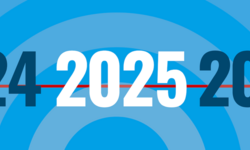
Our outlook on internet policy matters in 2021
It comes as no surprise that 2021 too will be dominated by the coronavirus pandemic and political activity will focus on the battle against the infectious disease. Nevertheless, there are many issues advancing in the background which need to be worked on. Many of these have been on our radar for quite a while now, and new ones will arise for sure. If the past year has taught us anything, it is reacting quickly and bracing ourselves for spontaneous legislative amendments on short notice.
In our review of 2020 you can read about what were up to last year. A lot from this article has found its way back into this list, as we still have unfinished business at both European and national level. And naturally, something completely unexpected will come up in between - as it so happens in the political playing field.
International matters
- DSA - Digital Services Act
- DMA - Digital Market Act
- TERREG – Regulation on preventing the dissemination of terrorist content online
- Interim regulation on ePrivacy
- Encryption ban
National matters
- The „Anti Online Hate Speech“ package and its impact
- The Austrian implementation of the Copyright Directive
- The electronic vaccination record
- Reform of the BVT (Austrian intelligence service)
- E-ID and electronic driving license
- Office for complaints against police violence
- AMS algorithm (AMS = Public Employment Service Austria)
- Amendment to the Telecommunications Act (TKG)
- ReclaimYourFace / facial recognition
- Transparency Act
Digital Services Act (DSA)
The DSA has been worked on for some time. With it, the EU aims to create a European platform regulation, which is supposed to govern communication platforms such as Facebook, Twitter & Co and hold them accountable. We have participated in the process since a very early stage, answered questions about it on many occasions and we will stay with it further. Of course we also submitted our own proposals, which we presented on platformregulation.eu. It is important to us that platform regulation complies with fundamental rights and we will continue to advocate the matter.
Digital Markets Act (DMA)
The DMA primarily intends to regulate digital offers within the EU in terms of competition law. The main issue here will be to determine the responsibility of companies which hold a certain market position.
TERREG
There was a lot of talk about this regulation, as upload filters were once again an issue here. The aim is to prevent the dissemination of terrorist content on the internet. Just a few days ago, the European Parliament’s Committee of Home Affairs approved this regulation with a majority. While obligatory upload filters are apparently off the table, a one hour deletion period seems very unrealistic and we consider a cross-border deletion order without judicial review to be highly problematic with regard to our freedom of expression and freedom of the press. This regulation will lead to over-blocking.
Interim regulation on ePrivacy
Unfortunately, the adoption of an ePrivacy Directive has been delayed for years. Again and again we point out how necessary it is. In September 2020 however, the EU Commission proposed an “interim regulation”, which focuses on combating sexual exploitation and depiction of minors on the internet. It creates the legal basis for providers to search their networks and traffic for problematic content of this kind. The interim regulation is scheduled to be voted on in a plenary assembly the beginning of February.
Encryption ban
A plan to ban encryption also caused quite some furor towards the end of the year. The Council of the EU passed a non-binding resolution on the matter to keep the topic up and moving. Unfortunately, there is no proper way for the public to participate at this stage of the process. The interior ministers negotiated this non-binding resolution behind closed doors. Nevertheless, we – together with other NGOs – have already addressed the issue in an open letter to the Council. Behind the scenes we tirelessly participate in discussions aiming to point out the disastrous consequences this proposal entails and to appeal to the people in charge with arguments. However, the underlying issue is a structural problem of non-transparency in the Council of the EU. Rights to freedom hardly ever stand a chance in the Council. This is precisely why we signed an open letter to the current Portuguese Council Presidency. At the moment, many national-level civil society organizations across Europe are trying to steer this decision in the right direction.
The “Anti Online Hate Speech” package
The “Anti Online Hate Speech” package, which has already been adopted, comprises three parts: one is targeted at regulating platforms (KoPl-G) and precedes the DSA. Another part contains amendments to criminal law (e.g. upskirting, which means taking intrusive photos up someone’s skirt, is now illegal), and the last part is known as “Act against Online Hate Speech”. Fortunately, a lot of our criticism was taken into account. However, we are still bothered by the fact that companies can sue for personal rights on behalf of employees. Anyway, we are curious to see how this law will be applied in practice.
Copyright
We fought against Article 17 for a long time, hoping to prevent upload filters at EU level already. As we did not succeed in this mission, we also participated in the national negotiations on the Austrian implementation of the Copyright Directive. Just before the end of the year, on December 28, we submitted our statement on the government bill. In our view it requires improvement in several points. We are definitely going to stay with it.
The electronic vaccination record
The electronic vaccination record, which had been devised for some time, has already been implemented partially and is about to gain momentum. The central vaccination registry shall provide the data base for decisions and efficiency enhancements in the healthcare system. We already criticized that the electronic vaccination record does not provide for opting out. We would also have appreciated if obligatory vaccination registration had been limited to cover only vaccinations where non-administration poses a threat to others (i.e. vaccines against contagious diseases).
Reform of the BVT
While it has been talked about for a long time, the issue is actually about to be tackled now: a long overdue reform of intelligence services – not least because the terrorist attack in Vienna has brought the institution back into the public eye. We have spent quite some time considering how such a reform should look like. One of our demands is that no new surveillance powers be established, as we believe the current ones are sufficient. We published this position and eleven further touchstones for a reform of the BVT at the end of the year. Now we will closely follow up on the exact design of the reform. You'll find out about that on here as well as in one of our newsletters - subscribe now!
E-ID and the electronic driver's license
Austria has been planning an e-ID (electronic identity) for many years now. Now it is about to become a reality. Initially, it shall serve as the basis for the electronic driving license, which is to be introduced in spring 2021. We expressed our demands very clearly in the review procedure of the 2017 amendment to the eGovernment Act and we uphold them as they are still relevant today. Among other things, we advocate a decentralized system and strict oversight of public-private partnerships, i.e. use of this identity by private companies. We are curious to see how the e-ID will be put into practice.
Office for complaints against police violence
Civil society has been calling for an independent body to investigate cases of police violence since long before the right-wing conservative and green coalition government. There were rays of hope when this demand appeared in the government program. However, this body has not been established yet and aspirations in this regard are slowly dying down. Together with Amnesty International and many other organizations and experts, we put forward demands for reforming the police. We will continue to raise awareness for this issue in 2021 as well and hold the people in charge accountable.
AMS algorithm
We claimed that the use of AMS algorithm (AMS = Public Employment Service Austria) be banned, not least due to the coronavirus pandemic. This system is designed to divide people in search of work into three categories and it is extremely discriminative. A study too has shown that this system should not be used in its current form. The data protection authority shared this view, but the Federal Administrative Court upturned the decision, ruling that the use of the algorithm is permitted. We have already contacted the new minister of labor and hope to be heard in this matter as well, since we repeatedly demonstrated why this system is unfair and should be abolished. You can still sign our petition!
Amendment to the Telecommunications Act TKG
A new version of the TKG will be passed because of a change in the European legal framework due to the Electronic Communications Code. Since the TKG regulates many areas of digital communication and therefore is a very important law for us too, we will have to take a close look at it. Modernizing the TKG and adjusting it to today’s circumstances is crucial because the law often lags behind technological development. The review period for this law, which also intends to improve consumer protection and competition law, ends on February 10 and we are currently working on our statement.
ReclaimYourFace / Facial recognition
At the beginning of January, a kind of “people’s petition” – a so-called European Citizens’ Initiative (ECI) – was registered at European level, which aims to ban the use of biometric data (including facial recognition). We support this initiative and will report on its status regularly. It needs more than one million votes from seven EU countries. Updates will be posted on reclaimyourface.eu – as well as on our channels of course! We are going to pursue the topic in Austria too as the current use of facial recognition lacks an explicit legal basis.
Transparency Act
A large part of our work consists of gathering information. For this purpose, we use fragdenstaat.at as well as parliamentary inquiries submitted by members of the National Council. We depend on freedom of information and we sincerely hope that after years of discussion, a good transparency law will be passed this year - as announced by minister of justice Alma Zadić.
The article was published in German first. Translation by Victoria Kontrus.
Since you're here
… we have a small favour to ask. You want to keep a close eye on the government? You want to stay up-to-date on surveillance, privacy, net neutrality, and all matters related to your fundamental rights on the internet? Subscribe to our newsletter and approximately once a month, we will send you a message (in German) about everything that happens around digital policy in Austria and in Europe, about our actions, legal analyses and position papers.
Together, we defend our fundamental rights in the digital age – because civil society works! Stay informed!







